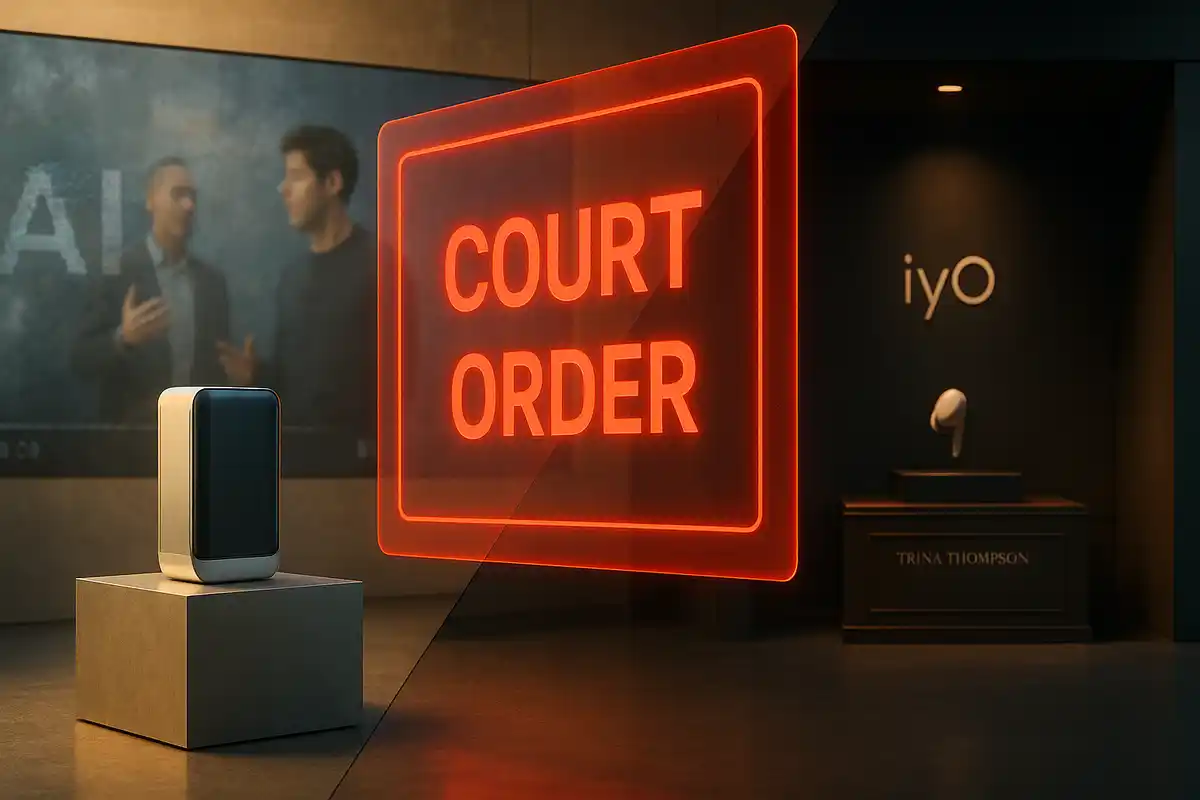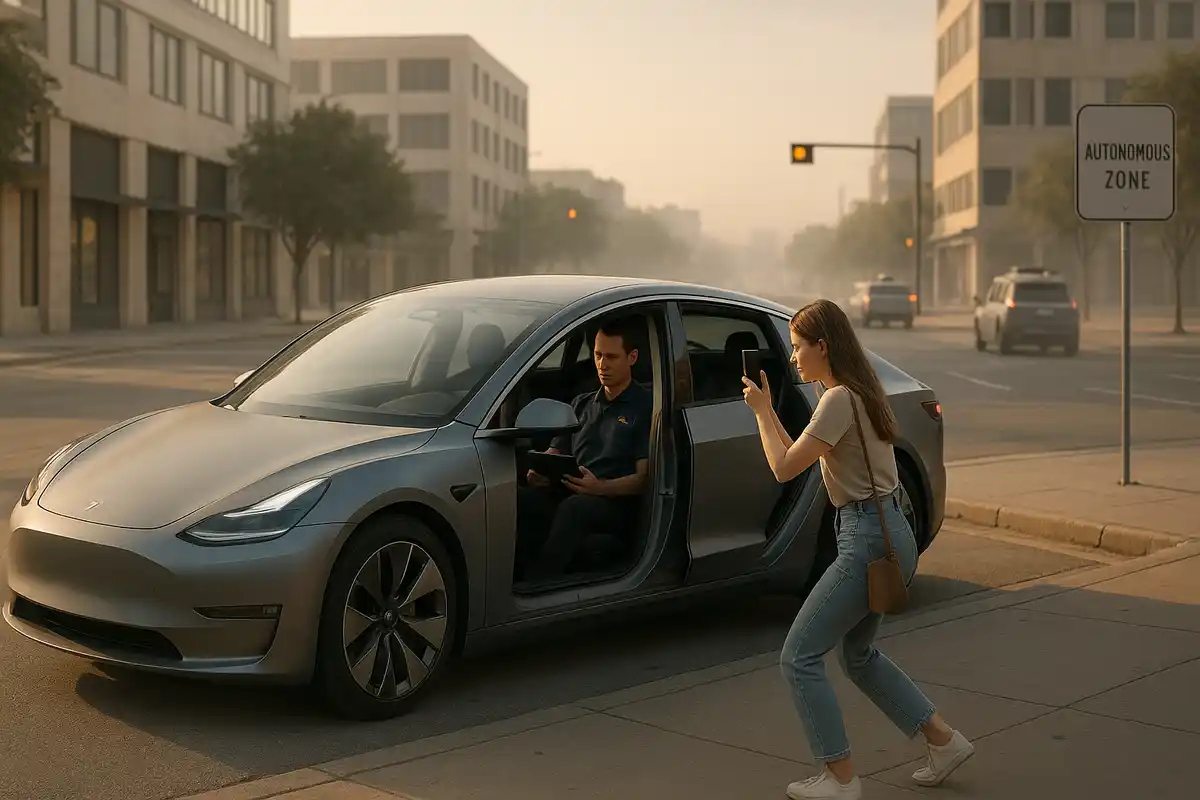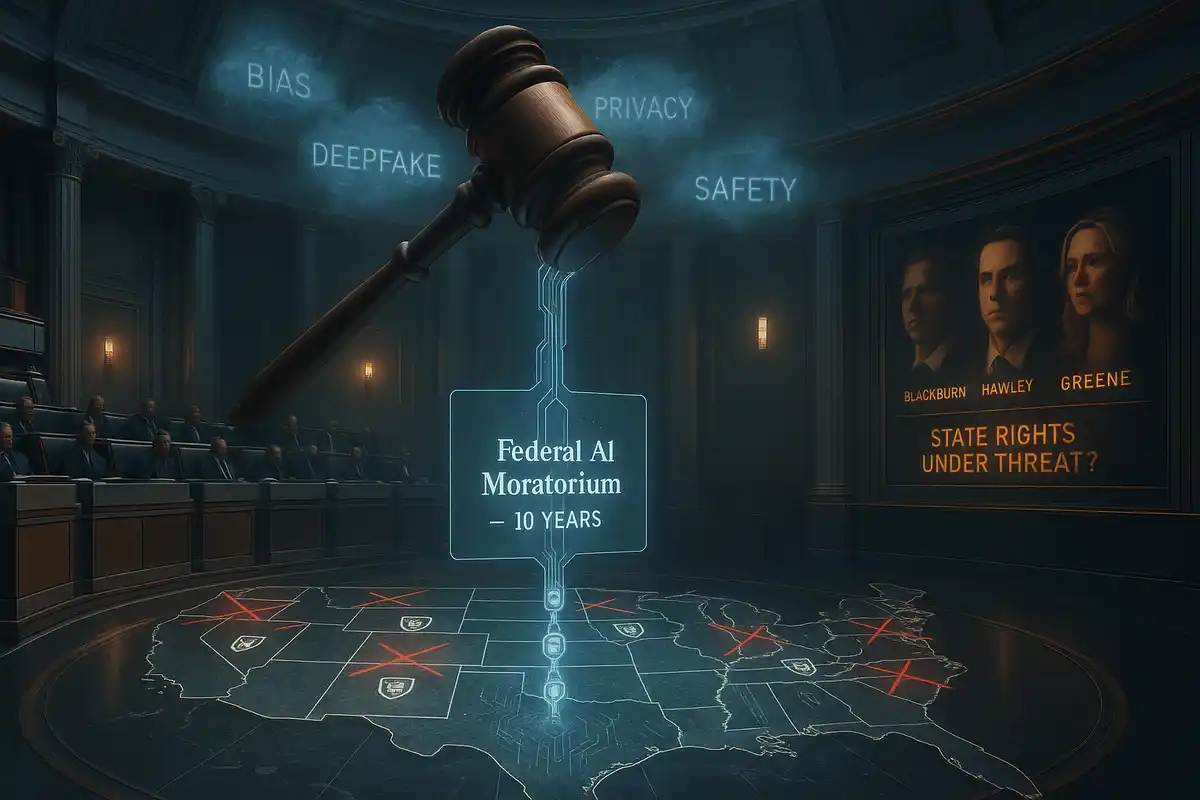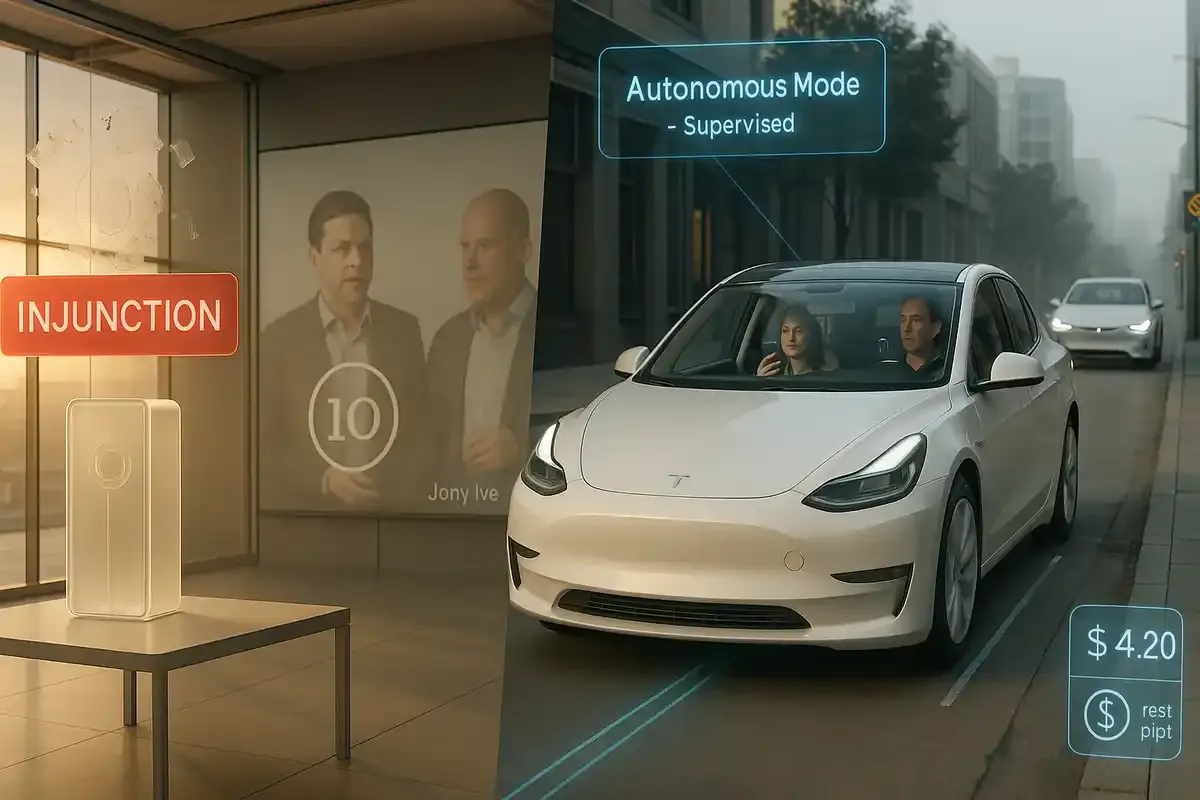Good Morning from San Francisco, 🌉
OpenAI scrubbed its $6.5 billion Jony Ive acquisition videos after a judge sided with trademark challengers. The culprit? iyO, an Alphabet spinoff making AI earbuds, claims OpenAI's "io" branding confuses consumers. 🎧
Judge Trina Thompson granted iyO a restraining order. OpenAI pulled promotional materials featuring Ive and CEO Sam Altman discussing their "coolest piece of technology" hardware plans. ⚖️
The deal stays alive despite the legal hiccup. OpenAI disagrees with the complaint and reviews options. Meanwhile, iyO ships its $99 voice-only earbuds in August. 💰
Tesla launched robotaxis in Austin with training wheels. The company charges $4.20 per ride but plants a Tesla employee in each passenger seat as "safety monitor." Ten cars serve handpicked influencers in a tiny zone from 6 AM to midnight. 🚗
Musk finally collected money for autonomous rides after a decade of promises. But the heavy restrictions suggest the technology isn't ready for prime time. 🤖
Stay curious, ✨
Marcus Schuler
Alphabet spinoff blocks OpenAI's "io" branding with lawsuit

OpenAI yanked promotional materials for its $6.5 billion acquisition of Jony Ive's hardware startup after a judge sided with a trademark challenger. The company removed a nine-minute video featuring Ive and CEO Sam Altman from its website and social channels.
The trouble comes from iyO, an AI earbud maker that spun out of Alphabet's moonshot lab. The company claims OpenAI's use of "io" creates consumer confusion with its own products. Judge Trina Thompson granted iyO a temporary restraining order, forcing OpenAI to scrub mentions of the disputed name.
The legal mechanics
OpenAI insists the acquisition remains on track despite the court order. Company spokesperson Kayla Wood said they disagree with the complaint and are reviewing options. The deal would bring Ive's design expertise to OpenAI's hardware ambitions.
iyO makes AI-powered earbuds that rely entirely on voice commands. CEO Jason Rugolo demonstrated the iyO One at a TED talk, describing it as "natural language computing" through conversation. The device costs $99 and ships in August.
What's at stake
The removed video showed Ive and Altman discussing their plans for AI hardware. Ive called the partnership the culmination of 30 years of design work. Altman claimed their prototype was "the coolest piece of technology that the world will have ever seen."
The companies plan to create an unobtrusive AI device that sits on desks and complements existing Apple products. Unlike failed hardware like the Humane AI Pin, this device won't try to replace smartphones.
Why this matters:
• A simple trademark dispute temporarily derailed one of AI's biggest hardware bets, showing how legal technicalities can disrupt major deals
• The fight reveals growing competition in AI hardware as companies rush to build the next breakthrough device
Read on, my dear:
AI Image of the Day

Prompt:
a young cute chubby blonde Chinese woman with a white t-shirt with green horizontal stripes stands in a park, licking an ice cream in a cone. Eye contact
Musk's decade-long promise finally launches with training wheels

Tesla launched its robotaxi service Sunday in Austin with about 10 cars carrying invited passengers for $4.20 per ride. The company put a Tesla employee in each passenger seat as a "safety monitor" while leaving the driver's seat empty.
The launch marks Tesla's first paying autonomous rides after a decade of promises from CEO Elon Musk. Tesla stock jumped 0.7% in early Monday trading as investors weighed whether the small-scale debut justified the hype.
Limited scope raises questions
The service operates only in a restricted South Austin area from 6 AM to midnight. Tesla handpicked about 20 social media influencers for the trial and will avoid bad weather and difficult intersections. The company won't carry passengers under 18.
Tesla uses only cameras for navigation, unlike competitors Waymo and Zoox who rely on radar and lidar sensors. Waymo already runs commercial robotaxis in multiple cities without safety drivers.
Regulatory hurdles ahead
Texas Governor Greg Abbott signed legislation Friday requiring state permits for autonomous vehicles starting September 1. The law gives officials power to revoke permits from companies deemed unsafe.
Tesla tried to block public records requests about the service from TechCrunch and Reuters, citing trade secrets. One observer spotted a robotaxi hitting its brakes twice in an intersection before picking up passengers.
Why this matters:
• Tesla finally took money for autonomous rides, but the heavy restrictions suggest the technology isn't ready for real-world deployment
• The stock's 35% rally since October's robotaxi event may have already priced in this limited launch
Read on, my dear:
🧰 AI Toolbox

NLX.ai is a conversational AI platform that helps organizations build and deploy AI-powered voice and chat assistants. The company focuses on creating natural-language interfaces for customer service, healthcare, and other business applications.
Getting Started with NLX.ai
What You Can Build
- Voice assistants for phone support
- Chatbots for websites and apps
- Virtual agents for scheduling and information
- Healthcare conversation tools
Basic Setup Process
1. Sign Up and Access Create an account at nlx.ai and access their Dialog Studio - the main interface for building conversational flows.
2. Design Your Conversation Use their visual flow builder to map out how conversations should work. You drag and drop elements to create paths users can take through your assistant.
3. Train Your Model Upload sample conversations or use their templates. The system learns from these examples to handle similar requests.
4. Test and Refine Use the built-in simulator to test conversations. Adjust responses and flows based on how well the assistant performs.
5. Deploy Connect your assistant to your phone system, website, or app using their APIs and integrations.
Key Features
- No-code builder: Create assistants without programming
- Voice and text: Handle both spoken and written conversations
- Integration tools: Connect to existing business systems
- Analytics: Track performance and user interactions
Getting Help
Start with their documentation and tutorials. NLX offers training sessions and support to help you build effective conversational experiences.
The platform works best when you start simple - build a basic assistant first, then add complexity as you learn how users interact with it.
AI & Tech News
The Last Human Warehouse Job Gets Automated
Robots can now unload trucks. The physically demanding work that has stumped automation for years finally has a mechanical solution, with companies like DHL, UPS, and Walmart deploying robotic systems that handle packages weighing up to 50 pounds and work nearly twice as fast as humans.
America and China Control the Chips, Everyone Else Waits
Only 32 countries have AI data centers capable of building advanced systems, leaving more than 150 nations completely shut out of the technology that could reshape global economics and power. The US operates 87 AI computing hubs while most of Africa and South America have none, creating a new digital divide where access to graphics processing units determines who gets to participate in the AI revolution.
Apple Scrambles to Avoid EU Fines Before Thursday Deadline
Apple faces a Thursday deadline to change its App Store policies or trigger escalating EU fines that could reach 5% of its daily revenue. The company is negotiating with Brussels regulators over rules that block users from finding deals outside the App Store, after already paying a €500 million penalty for breaking the Digital Markets Act.
Retail Giant Builds Tech Campus to Battle Amazon and Digital Rivals
Walmart spent billions on a gleaming 350-acre headquarters with robots, electric bikes, and amenities that rival Silicon Valley campuses. The retail giant needs tech talent to compete with Amazon and digital-native companies, but convincing engineers to move to Arkansas requires more than just everyday low prices and wood-paneled offices from the 1960s.
Former Prosecutor Turned VC Says Stablecoins Will Replace Traditional Banking
Katie Haun left Andreessen Horowitz to start her own $1.5 billion fund focused on stablecoins—digital tokens pegged to the dollar that now handle more transactions than Visa. The former federal prosecutor who created the government's first crypto task force argues that companies like Walmart and Amazon will save billions by using stablecoins instead of traditional payment rails, while critics worry about losing control over monetary policy.
Music Industry Builds AI Song Detection Network
The music industry learned its lesson when a fake Drake song fooled millions of listeners. Now companies are building detection systems that work across the entire music pipeline—from AI training data to streaming platforms—not to stop synthetic music but to track it, tag it, and control how it spreads through licensing deals.
Disney Sues AI Company to Protect Darth Vader
Disney filed its first lawsuit against an AI company, targeting Midjourney for training models on copyrighted characters like Darth Vader and Deadpool without permission. The entertainment giant wants to set a legal precedent that protects studio intellectual property from being used in AI training data, marking a shift from Hollywood's past strategy of fighting new technology instead of embracing it.
US Senate clears path for nationwide AI regulation ban

Republicans won a key vote to include a 10-year ban on state AI laws in Trump's tax package. The Senate parliamentarian ruled Saturday that the provision can stay in the bill, letting Republicans pass it with a simple majority.
The measure would cut federal broadband funding from any state that enforces AI regulations. Senator Ted Cruz rewrote the original House version to tie the ban to federal spending, helping it survive budget rules.
Republican split emerges
The provision divides the GOP. House Speaker Mike Johnson says Trump and AI czar David Sacks back the ban. But several Republicans oppose it, including Senators Marsha Blackburn and Josh Hawley.
"We do not need a moratorium that would prohibit our states from stepping up and protecting citizens," Blackburn said. Representative Marjorie Taylor Greene called it "a violation of state rights" and threatened to vote against the entire tax bill.
States already moving on AI
California, New York, and Utah have passed or considered AI laws covering privacy, deepfakes, and government use. Over 200 state lawmakers from both parties want Congress to drop the federal ban.
The measure could wipe out consumer protection laws on children's online safety and AI bias. Congress has not passed federal AI rules, leaving states to fill the gap.
Republicans argue that 50 different state rules would create chaos for companies and hurt national security. Democrats plan to challenge the provision when the bill reaches the Senate floor this week.
Why this matters:
• The federal government wants to stop states from regulating AI before writing its own rules, creating a regulatory vacuum
• Tech companies get their wish to avoid a "patchwork" of state laws while facing no federal oversight
Read on, my dear:
- Senate.gov: More Provisions in Republicans’ “One Big, Beautiful Bill” Are Subject to Byrd Rule, Parliamentarian Advises
🚀 AI Profiles: The Companies Defining Tomorrow
Cohere: Canada's AI heavyweight targeting enterprise wallets while rivals chase consumer eyeballs.
This Toronto startup turned Transformer research into a $5.5B business selling language models to companies that won't touch Big Tech APIs.
• The Founders Founded 2019 by three Google Brain alumni: Aidan Gomez (co-authored the famous Transformer paper), Nick Frosst, and Ivan Zhang. All University of Toronto grads who saw breakthrough AI tech gathering dust in labs. Now 500+ employees across Toronto and San Francisco. Built the company because "computers woke up and started speaking back to us" but the world wasn't listening.
• The Product Command family of large language models delivered via API. Core strengths: private deployment (your data never leaves your cloud), multilingual support (100+ languages), retrieval-augmented generation (reduces AI hallucinations), and cloud-agnostic platform. Can fine-tune models on customer data. Powers Oracle's business apps, RBC's banking platform, and enterprise chatbots worldwide. Built for compliance-heavy industries that need AI but won't risk data exposure.
• The Competition Battling OpenAI's ChatGPT dominance and Anthropic's $20B+ valuation. Meta's open-source LLaMA models threaten pricing power. Google, Microsoft, and Amazon offer competing models through their clouds. Cohere's edge: stays neutral, works with all cloud providers, focuses purely on enterprise needs. No flashy consumer products - just boring, profitable business AI. 🎯
• Financing Nearly $1B raised from Silicon Valley's finest: Index Ventures, Tiger Global, Oracle, Salesforce, Nvidia, AMD. Latest $500M Series D valued company at $5.5B. Canadian government chipped in $240M for domestic AI infrastructure. Revenue hit $35M run-rate by 2024 (tripled in months). Investors betting enterprise AI demand justifies sky-high valuation.
• The Future ⭐⭐⭐⭐ Strong enterprise positioning as companies seek Big Tech alternatives. Canadian government backing provides strategic moat. Revenue growth accelerating as pilot projects become production deployments. Risk: open-source models could commoditize the space. Legal challenges from publishers over training data loom. Must prove $5.5B valuation with massive revenue scale-up. Playing Switzerland in AI wars could win long-term. 🇨🇦








